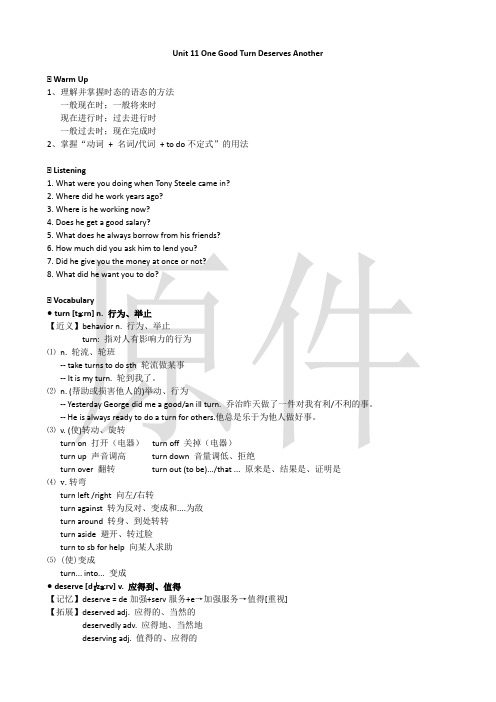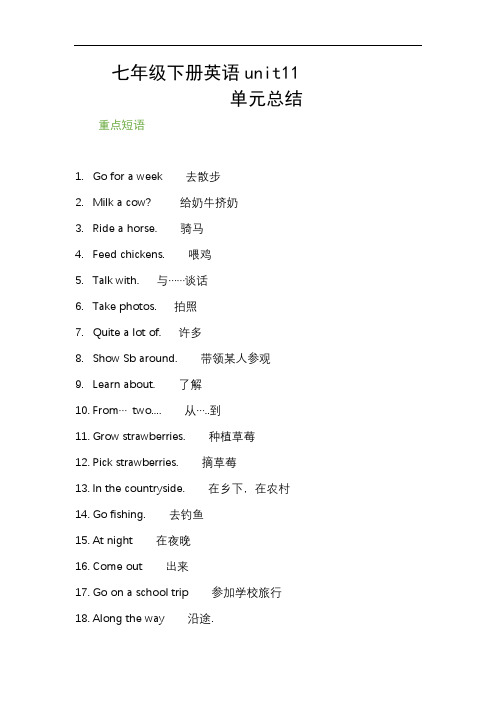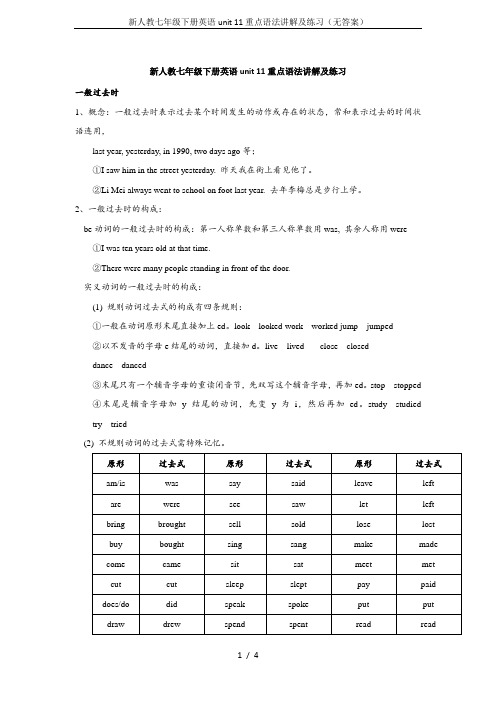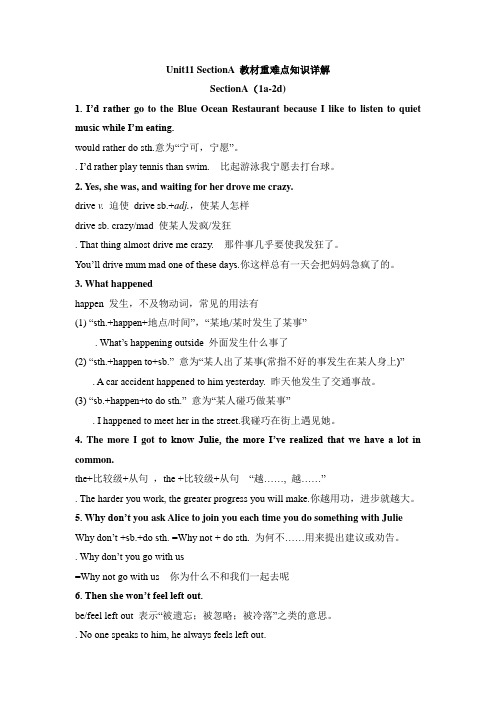11电梯A班英语语法(二)
外研版英语八年级上册Module11单元知识点归纳总结(详细版)

Module11 Way oflifeUnit1 In China, we open a gift later.1.It ’s cool to wear a cap back-to-front.把鸭舌帽前后反过来戴很酷。
2.If she is interested in playing chess, it ’s a good idea tochoose a chess set as a present.3. We Chinese usually have meals with chopsticks/ while Westerners(西方人) use knives and forks for meals. This pair of chopsticks is pretty nice.(谓语是由pair 决定的)A knife and fork ___ on the table now. (is )a knife and fork 一副刀叉表示一个整体,用单数。
4.A bar of chocolate is a perfect choice for those who prefer(更喜欢) sweet food.5.Students need to look up new words in dictionaries to improve their study.6. Little babies would like to play with toys.7. Video games are not popular with teenagers any longer now. 现在电子游戏不再受青少年欢迎了。
8. H ere ’s your gift.H ere ’s the change(找头,零钱)/money. Here are some flowers for you. 9. What a big surprise!n.1)in surprise “惊奇地”常位于动词之后作状语,表示方式。
lesson11-12语法

LESSON11
1. Tony is working at a bank ______ . a. at the moment b. a year ago c. since last year d. for a year
LESSON11
2 .
He gets a good salary. His salary is very ______ . a. good b. well c. fine d. beautiful
LESSON11
Pay
vi. Vt. Pay sb.“付款给某人” 例句:You haven’t paid the tailor yet. Pay for sth.为…付钱 例句:How much did you pay for that dress?
LESSON11
pay
LESSON11
1 )I
asked him to lend me twenty pounds. 2)I want to speak to John. 3)I want you to speak to John. 4)Would you like to do sth.? 5)I’d like sb. to do sth. 6)I’d like to do sth.
பைடு நூலகம் OOPS!!
2.sail
v. 航行 1) vi. (船)航行,扬帆行驶 例句:The ship is sailing for New York. Sail for 驶向某处
2)
vi. (人)乘船航行 我想乘船环游世界。 例句:I want to sail around the world. 3)例句:This boat has white sails. n. 帆,篷
Unit Eleven 语法讲解(11单元语法讲解)

Unit Eleven 宾语从句语法讲解:宾语从句:一,宾语从句的定义:在复合句中作宾语的从句叫宾语从句。
考点一,宾语从句的引导词1,如果宾语从句是由陈述句转变而来时,其引导词用that引导, that 无意义,在口语中和非正式用语中常省略。
如:They are good doctors . He tell us .------ He tell us (that) they are good doctors .2,如果宾语从句是由一般疑问句转变而来,其引导词要用if / whether ,意为“是否”。
如:Mr. chen asks , “ Are you all here ? .” ------ Mr. chen asks if / whether we are all here . 3,如果宾语从句是由特殊疑问句转变而来的,其引导词用原来的疑问词。
如:Tom asked me ,” When did you begin to study English ?” ------Tom asked me when I began to study English .[ 口诀陈述that 来引导,有时可以省略掉。
一般问句表“是否”,if 或whether 来引导。
特殊问句作宾从,疑问词连接就可行。
考点二,宾语从句的时态1,主句的时态为一般现在时,从句的谓语动词的时态要根据具体的情况用相应的任何时态。
如:Mike knows (that) the doctor has returned . 迈克知道这个医生已经回来了。
I don’t know if my sister was having a party at home at 9:00 last night . 我不知道昨天晚上九点我的妹妹是否正在家里举行一场聚会。
2,主句的时态为一般过去时,从句的谓语动词的时态要用相应的某一过去的时态。
如:The lady said she would buy a gift for her son .这位夫人说她将为儿子买件礼物。
新概念英语第二册 Lesson 11 One good turn deserves another

新概念英语第二册Lesson 11 One good turn deserves another 礼尚往来重点句型补充例句1. I know I shouldn't be dwelling on this, but I would like to see what other people have to say. So I was having dinner at an Indian restaurant with a friend and we were sitting next to a table of four, comprised of two attractive females with two guys. By the way they were interacting with each other I don't think they were on a date, rather I think they are just a group of friends having dinner. The entire time I was thinking of ways to approach, I even made eye contact with one of them once or twice. But by the end of the meal, I ended up just paying the bill and taking off.2. He is now working at the Department of Transport.3. She is now working at home caring for her two daughters.4. How to get a good salary job in the medical field?5.Here you can get a good salary comparatively to other companies.6. When you are selected for a new job, you need to do a few things so that you can get a good salary from the very beginning.7. For example, if you borrow $50, you can pay back $5 each week for 10 weeks. Or you can pay back $25 each month for 2 months. Whatever you and the lender decide, you must pay the money back when you promise to do so. Otherwise, your lender won’t want to loan y ou money any more.8. When you borrow money, the interest you pay is usually a percentage of the total you borrowed. This percentage is called the “Interest Rate.” You’ll see this rate referred to as the Annual Percentage Rate or APR, which is the interes t and fees you’ll pay over a year for borrowing money.9. Make sure that you can afford to pay back what you are going to borrow.10. Credit basically means borrowing money to spend now and pay back later. It can be used in many different ways such as by using a credit card11. How do I pay for my education? Is there special funding for students with disabilities?Notes on the text 课文注释1 One good turn deserves another. 这是句谚语,意思是对于别人的善意或帮助应作出相应的回报。
新概念英语二经典语法讲解Lesson 11

New Concept English新概念经典语法讲解Lesson 11 One good turn deserves another1.One good turn deserves another礼尚往来。
(1) turn n.(帮助或损害他人的)举动、行为:a. One good turn deserves another 礼尚往来, 善有善报One bad turn deserves another 恶有恶报b. You did me a good turn warning me that Abigail was going to be there.c. Yesterday George did me a good/ an ill turn. 乔治昨天做了一件对我有利/不利的事。
d. He is always ready to do a turn for others. 他总是乐于为他人做好事。
翻译训练1:(复习第九课)我向王治霖借钱,他拒绝了。
我很生气。
礼尚往来嘛,今天他要我借给他我的自行车,我拒绝了。
(ask sb. to do sth. 要求某人干某事)__________________________________________________________________________ __________________________________________________________________________ (2) deserve 应受、应得(奖赏、惩罚等)、值得通常为及物动词:▲deserve + n.a. You deserve a promotion after all the hard work you have done.你工作辛苦,应该得到提升。
b. He deserves praise.他应该得到表扬c. After all that hard work, you deserve a holiday.d. You deserve the best.你应该得到最好的e. If you do wrong, you deserve punishment. 你如做错事, 应当受罚。
新概念二Unit 11 One Good Turn Deserves Another最全知识点总结

Unit 11 One Good Turn Deserves Another★ Warm Up1、理解并掌握时态的语态的方法一般现在时;一般将来时现在进行时;过去进行时一般过去时;现在完成时2、掌握“动词+ 名词/代词+ to do不定式”的用法★ Listening1. What were you doing when Tony Steele came in?2. Where did he work years ago?3. Where is he working now?4. Does he get a good salary?5. What does he always borrow from his friends?6. How much did you ask him to lend you?7. Did he give you the money at once or not?8. What did he want you to do?★ Vocabulary● turn [tɜ:rn] n. 行为、举止【近义】behavior n. 行为、举止turn: 指对人有影响力的行为⑴n. 轮流、轮班-- take turns to do sth 轮流做某事-- It is my turn. 轮到我了。
⑵n. (帮助或损害他人的)举动、行为-- Yesterday George did me a good/an ill turn. 乔治昨天做了一件对我有利/不利的事。
-- He is always ready to do a turn for others.他总是乐于为他人做好事。
⑶v. (使)转动、旋转turn on 打开(电器)turn off 关掉(电器)turn up 声音调高turn down 音量调低、拒绝turn over 翻转turn out (to be).../that ... 原来是、结果是、证明是⑷ v.转弯turn left /right 向左/右转turn against 转为反对、变成和....为敌turn around 转身、到处转转turn aside 避开、转过脸turn to sb for help 向某人求助⑸ (使)变成turn... into... 变成● deserve [dɪˈzɜ:rv] v. 应得到、值得【记忆】deserve = de加强+serv服务+e→加强服务→值得[重视]【拓展】deserved adj. 应得的、当然的deservedly adv. 应得地、当然地deserving adj. 值得的、应得的【搭配】deserve + n. /pron. 应该得到....、值得.....、应得(奖赏、惩罚等)-- He deserves praise. 他应该得到表扬。
人教版七年级下册英语11单元知识点总结

七年级下册英语unit11单元总结重点短语1.Go for a week 去散步k a cow? 给奶牛挤奶3.Ride a horse. 骑马4.Feed chickens. 喂鸡5.Talk with. 与……谈话6.Take photos. 拍照7.Quite a lot of. 许多8.Show Sb around. 带领某人参观9.Learn about. 了解10.From…two.... 从…..到11.Grow strawberries. 种植草莓12.Pick strawberries. 摘草莓13.In the countryside. 在乡下,在农村14.Go fishing. 去钓鱼15.At night 在夜晚e out 出来17.Go on a school trip 参加学校旅行18.Along the way 沿途.19.After that 之后.20.All in all. 总的说来。
21.Take a\the train. 乘火车22.Be interested in 对…感兴趣?.23.Not…at…all. 根本不…24.So much fun. 如此多的乐趣。
25.Fire station. 消防站26.Make a model robot. 制作机器人模型。
重点句型1.What did sb do? 某人做什么了?——What did carl do? 卡罗尔做什么了?——She picked some strawberries.她摘了一些草莓。
2.How was\were...? .....怎么样?——How was your school trip? 你的学校旅行怎么样?——It was great. 太棒了!3.Did. Sb. Do sth. 某人做某事了吗?——Did you go to the zoo? 你去动物园了吗?——No, I didn't. I went to a farm. 不,我没有,不我去农场了。
人教新目标版八年级上册英语unit11知识点总结

Unit 11 ——情态动词I、常见情态动词的用法一、can 的用法:(1)表示能力。
表示能力时一般译为“能、会”,即有某种能力,尤其是生来具备的能力,此时may 和must 均不可代替它。
She can swim fast, but I can’t. 她能游得很快,但我不能。
I can see with my eyes. 我用眼睛看。
(2)表示许可,常在口语中。
You can use my dictionary. 你可以用我的字典。
(3)表示推测。
表示推测时,意为“可能”,常用于否定句和疑问句中,此时can’t 译为“不可能”。
Can the news be true? 这个消息会是真的吗?—Can it be our teacher? 那个人有可能是我们老师吗?—No, it can’t be our teacher. He is on a visit to the Great Wall.不可能。
咱们老师正在游览长城呢。
二、could的用法:(1)can的过去式,意为“能、会”,表示过去的能力。
He could write poems when he was 10、他十岁时就会写诗。
(2)could在疑问句中,表示委婉的语气,没有过去式的意思。
Could you do me a favour? 你能帮我个忙吗?—Could I use your pen? 我能用一下你的钢笔吗?—Yes, you can. 可以。
三、may的用法:(1)表示请求、许可,比can 正式。
May I borrow your bike? 我可以借你的自行车吗?You may go home now. 现在你可以回家了。
(2)表示推测,谈论可能性,意为“可能,或许”,一般用于肯定句中。
It may rain tomorrow. 明天可能会下雨。
She may be at home. 她可能在家呢.(3)may的过去式为might,表示推测时,可能性低于may。
新概念英语第二册逐句精讲语言点第11课(3)

新概念英语第二册逐句精讲语言点第11课(3)Lesson 11 One good turn deserves another课文内容:I was having dinner at a restaurant when Harry Steele came in. Harry worked in a lawyer's office years ago, but he is now working at a bank. He gets a good salary, but he always borrows money from his friends and never pays it back. Harry saw me and came and sat at the same table. He has never borrowed money from me. While he was eating, I asked him to lend me &2. To my surprise, he gave me the money immediately.‘I have never borrowed any money from you,' Harry said,'so now you can pay for my dinner!'精讲笔记:7.To my surprise, he gave me the money immediately.让我吃惊的是,他马上借钱给我。
语言点1 to one's surprise让某人吃惊的是语言点2 give me the money=give the money to me把钱给了我8.‘I have never borrowed any money from you,' Harrysaid,'so now you can pay for my dinner!'“我从来没向你借过一分钱,”托尼说,“所以现在你能够替我付饭钱了!”语言点 any一词常用语否定句,在此表示强调。
Unit 11知识点归纳

Unit 11知识点归纳1.宾语从句:宾语从句在复合句中作主句的宾语。
①由连接词+ 主语+ 谓语构成,常由下面的一些连接词引导:②由that 引导表示陈述意义,that 可省略He says (that) he is at home. 他说他在家里。
③由if , whether 引导表示一般疑问意义(带有是否、已否、对否等)I don’t know if / whether Wei Hua likes fish. 我不知道韦华是否喜欢鱼。
④由连接代词、连接副词(疑问词) 引导表示特殊疑问意义Do you know what he wants to buy? 你知道他想要买什么吗?⑤从句时态要与主句一致:当主句是一般现在时,从句根据情况使用任何时态He says (that ) he is at home. 他说他在家里。
I don’t know (that) she is singing now. 我不知道她正在唱歌。
She wants to know if I have finished my homework. 她想要知道我是否已经完成了我的作业。
Do you know when he will be back? 你知道他将会什么时候回来?当主句是一般过去时,从句应使用过去某时态(一般过去时,过去进行时,过去将来时,过去完成时)He said (that) he was at home. 他说他在家里。
I didn’t know that she was singing now. 我不知道她正在唱歌。
She wanted to know if I had finished m homework. 她想要知道我是否已经完成了我的作业。
Did you know when he would be back? 你知道他将会什么时候回来?2. ①问路常用的句子:Do you know where …is ? Can you tell me how can I get to …? Could you tell me how to get to …?②Can/Could/Will/Would you please tell me sth. 表示十分客气地询问事情③Could you tell me how to get to the park?请你告诉我怎么才能去邮局好吗?中的how to get to the park是疑问词与动词不定式连用,用作宾语,但不是宾语从句,可是相当于how I can get to the park(宾语从句)。
lesson11新概念2

★deserve
v. 应得到, 值得
① deserve + n. 应该得到……,值 得……,应得(奖赏、惩罚等) He deserves praise. 他应该得到表扬 Good work deserves good pay. 多劳多得 ② deserve to do sth. 应该…… She deserved to be punished.
While he was eating, I asked him to lend me twenty pounds. ask sb. to do sth. 要某人做……. lend sb. sth.借给某人某物。 borrow sth. from sb.从sb借来 sth.
To my surprise, he gave me the money immediately. To one’s surprise 令某人惊讶的 是
男厕所
古典音乐
men’s room
classical music
【New words and expressions】
turn n. 行为,举止 deserve v. 应得到,值得 lawyer n. 律师 bank n. 银行 salary n. 工资 immediately adv. 立刻
When I worked as a waiter, the wages were low, but the tips were good. 我当侍者时工资不高,但小费可观。 pay n. 工资(salary+wage,通用) bonus n. 奖金, 分红 collect v. 搜集, 领取 collect salary/wage 领工资
新概念英语第二册知识点总结

新概念英语第二册知识点总结一、语法知识点。
1. 时态。
- 一般现在时。
- 用法:表示经常发生的动作或存在的状态,客观事实或真理等。
例如:He often goes to school by bike.(表示经常的动作)The earth moves around the sun.(客观真理)- 动词形式:主语为第三人称单数时,动词要加 -s或 -es,其余情况用原形。
- 一般过去时。
- 用法:表示过去某个时间发生的动作或存在的状态。
例如:I saw him yesterday.- 动词形式:规则动词一般在词尾加 -ed,不规则动词有特殊变化(如go - went,see - saw等)。
- 现在进行时。
- 用法:表示此时此刻正在进行的动作,也可表示现阶段正在进行但此刻不一定在做的动作。
例如:She is reading a book now.(此刻正在读)He is working on a project this month.(现阶段正在做)- 动词形式:be动词(am/is/are)+动词的 -ing形式。
- 过去进行时。
- 用法:表示过去某个时刻或某段时间正在进行的动作。
例如:When I called him, he was having dinner.- 动词形式:be动词(was/were)+动词的 -ing形式。
- 现在完成时。
- 用法:表示过去发生的动作对现在造成的影响或结果,或者表示从过去开始一直持续到现在的动作或状态。
例如:I have lost my key.(过去丢钥匙,现在找不到)He has lived here for ten years.(从过去住到现在,持续了十年)- 动词形式:have/has +过去分词。
- 过去完成时。
- 用法:表示在过去某个时间或动作之前已经发生或完成的动作,即“过去的过去”。
例如:When I got to the station, the train had already left.- 动词形式:had +过去分词。
朗文国际英语BOOK2 unit11讲解

情态动词总结
定义:情态动词用以表明说话者对于某一行为的态度和观点,主要包括 能力、可能、命令、要求、许诺等。情态动词没有人称和数量的变化。 通常情态动词具有多义性。 can表示能力、可能性、主观推测、允许、惊讶等意义。
He can speak English.
Beijing can be quite windy in spring. That can't be Mary, because she is in hospital. Can I use your book? How can you break the world record? can的特殊用法:can help but do 或者can't help doing"禁不住做" I can't help but think of my parents. / I can't help crying .
Six bottles of wine will be enough.
You are not old enough to buy alcohol.
Enough is enough! 适可而止
用法:用于动词、形容词、副词之后,名词之前。
as...as 的用法
1)as...as中加入形容词或者副词的原级。表示“像……一样”。否定 句时可以将第一个as 换成so.
6.不规则变化(见不规则变化表)
发音规律:清辅音后/t/ , liked jumped 浊辅音和元音后/d/ played t,d后读/id/ wanted needed
enough
adv.足够地
adj.充足的
新概念英语第二册11 one good turn deserves another(课堂PPT)

borrow与lend:
Borrow的意思是“借”,“借入”,经常与from 连用 Connie borrowed my pen yesterday. She hasn’t given it to me yet. Connie昨天借了我的笔,到现在还没还给我。
lend的意思是“把…借给”, “借出”,经常与介 词to连用: Can you lend your car to me this afternoon? 你今天下午能把车借我用一下吗?
• Who paid for Tony’s dinner?
8
Listen again and answer more.
• 1.What were you doing when Tony Steele came in ?
• 2.Where did he work years ago?
• 3.Where is he working now?
10
self-study check:match
• turn • borrow • deserve • lawyer • bank • salary • immediately • to my
surprise
银行
值得
律师
立刻马上
行为举止
令我惊讶的是
归还
借
薪水,工资
11
Words and expressions
6
Discussion
• Do you often lend money to your friends? • Do you often borrow money from your friends? • Will you return it timely? Do you think “One good turn deserves another ”(礼
新概念英语第二册语法精讲-Lesson11

新概念英语二-----------------LESSON 11重点词组:pay for 付费at a restaurant 在某餐馆at a bank 在某银行pay back 还钱borrow from 从……借来ask sb. to do 让某人做某事语法点:1. at / inat表示地点,一般用于小地点前,意为在……e.g.:at home 在家,at the station 在车站in表示地点、场所, 用于大地点前,意为在......里,在......中,e.g.:in China 在中国,in Beijing 在北京,in the middle of...在......的中间2. 花费cost指花费时间、金钱、精力等,主语只能是事物,宾语为人/金钱且无被动语态常用构成:sth. cost sb. 金钱/ 时间/ 精力e.g.:This watch costs me 1000 dollars. 这块手表花费了我1000美元。
spend指花费时间和金钱,只能用人做主语,宾语为时间/金钱,有被动语态常用构成:人spend time/money on sth.人spend time/money in doing sth.e.g.:I spent 5 days on reading this book. 我花了五天时间来读这本书。
take指花费时间和力气,主语一般只能事物,通常用形式主语it替代, 宾语为人/时间常用构成:It takes sb. some time to do sth.e.g.:It took me three days to learn how to swim. 学游泳花了我3天时间。
pay指为……支付金钱,主语为人,宾语为金钱常用构成:人pay some money for sth.e.g.:I paid 3 dollars for this book. 我为这本书花了3美金。
新人教七年级下册英语unit 11重点语法讲解及练习(无答案)

新人教七年级下册英语unit 11重点语法讲解及练习一般过去时1、概念:一般过去时表示过去某个时间发生的动作或存在的状态,常和表示过去的时间状语连用,last year, yesterday, in 1990, two days ago等;①I saw him in the street yesterday. 昨天我在街上看见他了。
②Li Mei always went to school on foot last year. 去年李梅总是步行上学。
2、一般过去时的构成:be动词的一般过去时的构成:第一人称单数和第三人称单数用was, 其余人称用were①I was ten years old at that time.②There were many people standing in front of the door.实义动词的一般过去时的构成:(1) 规则动词过去式的构成有四条规则:①一般在动词原形末尾直接加上ed。
look---looked work---worked jump---jumped②以不发音的字母e结尾的动词,直接加d。
live---lived close---closeddance---danced③末尾只有一个辅音字母的重读闭音节,先双写这个辅音字母,再加ed。
stop---stopped④末尾是辅音字母加y结尾的动词,先变y为i,然后再加ed。
study---studiedtry---tried(2) 不规则动词的过去式需特殊记忆。
3、一般过去时的几种句型:(1) be动词的一般过去时的句型:①肯定句结构为:主语+was / were+其它。
I was at home yesterday. They were really happy at the party.②否定句结构为:主语+was not (wasn’t) /were not (weren’t)+其它。
I wasn’t at home yesterday.They weren’t happy at the party.③一般疑问句结构为:Was / Were+主语+其它?---Were you at home yesterday? ---Yes, I was. / No, I wasn’t.---Were they happy at the party? ---Yes, they were. / No, they weren’t.④特殊疑问句结构为:疑问词+was / were+主语+其它?---Where were you last night? ---We were at my uncle’s house.---How was your weekend? ---It was great.(2) 实义动词的一般过去时的句型:①肯定句结构为:主语+动词的过去式+其它。
Unit11 SectionA 教材重难点知识详解

Unit11 SectionA 教材重难点知识详解SectionA(1a-2d)1. I’d rather go to the Blue Ocean Restaurant because I like to listen to quiet music while I’m eating.would rather do sth.意为“宁可,宁愿”。
. I’d rather play tennis than swim. 比起游泳我宁愿去打台球。
2. Yes, she was, and waiting for her drove me crazy.drive v.迫使drive sb.+adj.,使某人怎样drive sb. crazy/mad 使某人发疯/发狂. That thing almost drive me crazy. 那件事几乎要使我发狂了。
You’ll drive mum mad one of these days.你这样总有一天会把妈妈急疯了的。
3. What happenedhappen 发生,不及物动词,常见的用法有(1) “sth.+happen+地点/时间”,“某地/某时发生了某事”. What’s happening outside 外面发生什么事了(2) “sth.+happen to+sb.” 意为“某人出了某事(常指不好的事发生在某人身上)”. A car accident happened to him yesterday. 昨天他发生了交通事故。
(3) “sb.+happen+to do sth.” 意为“某人碰巧做某事”. I happened to meet her in the street.我碰巧在街上遇见她。
4. The more I got to know Julie, the more I’ve realized that we have a lot in common.the+比较级+从句,the +比较级+从句“越……, 越……”. The harder you work, the greater progress you will make.你越用功,进步就越大。
人教PEP七年级下册英语Unit 11 单元重点语法

Unit 11 单元重点语法长郡中学史李东一般过去时(一)1.定义一般过去时表示过去某个时间发生的动作或存在的状态,常和表示过去的时间状语连用。
例句:He went to school by bike yesterday. 昨天他骑自行车去上学。
2.构成(1)be动词的过去式:am,is的过去式是was;are 的过去式是were。
(2)实义动词的过去式:①一般在词尾加-ed。
例如:play—played; clean—cleaned②以字母e结尾的直接加-d。
例如:live—lived; like—liked③以“辅音字母+y”结尾的,变“y”为“i”,再加-ed。
例如: study—studied; worry—worried④末尾只有一个辅音字母的重读闭音节单词,先双写这个辅音字母,再加-ed。
例如:stop—stopped; plan—planned⑤不规则变化。
例如:let→let;put→put;cut→cut;do→did;go→went;have→had;eat→ate;buy→bought;write→wrote;swim→swam,sing→sang,begin→began 过去原形加“ed”,词尾有e只加“d”;辅音之后y结尾,y要变i加“ed”;词尾重读闭音节,双写辅音加“ed”。
过去分词过去式,不按规则也有些。
3.句型(1)含be动词过去时的句型:其否定句是在was/were后加not,其一般疑问句和特殊疑问句是把was/were提到主语前。
例句:—Were you at home yesterday?—Yes,I was./ No,I wasn't.(2)含实义动词过去时的句型:①肯定句:主语+动词过去式+其他.②否定句:主语+did not (didn't)+动词原形+其他.③一般疑问句:Did+主语+动词原形+其他? (其肯定回答用“Yes,主语+did”,否定回答用“No,主语+didn't.”)④特殊疑问句:疑问词+did+主语+动词原形+其他?【素材积累】1、人生只有创造才能前进;只有适应才能生存。
- 1、下载文档前请自行甄别文档内容的完整性,平台不提供额外的编辑、内容补充、找答案等附加服务。
- 2、"仅部分预览"的文档,不可在线预览部分如存在完整性等问题,可反馈申请退款(可完整预览的文档不适用该条件!)。
- 3、如文档侵犯您的权益,请联系客服反馈,我们会尽快为您处理(人工客服工作时间:9:00-18:30)。
Part Two English Grammatical Knowledge for English Test Level AI 强调句和倒装句1)It 引导的强调句结构。
此强调句的构成为it is (was) + 强调部分+ that+ 句子其他成分。
被强调的部分通常为主语、宾语、状语。
◆如果强调的部分是表示人的名词,那么也可以用who, 如果是指物的名词也可以用which, 但that比which 更常用。
It was Jane who lent me the money.It was this novel that/ which they talked about last night. \◆如果强调的是原因状语从句,只能用because引导,不能用since, as或why 引导。
It was because he had never had the opportunity that John hadn’t learnt to drive.2) do/ does/ did + 动词远些用在陈述句中或祈使句中表示加强语气。
I did telephone you yesterday, but you were not in.3) 宾语从句,表语置于句首,一般不引起句子主语与谓语的倒装,这样的前置起强调作用。
A foolish mistake he has made.Very delighted she appeared.True friend David certainly is.4) 用词汇手段进行倒装起强调作用。
能用于强调的词汇有:very, ever, on earth, in the world (用于特殊疑问句),right,just 等。
Here is the very reference book I am looking for.Put it right in the middle.This is just the book I want to buy.5) 以neither, nor ,so 开头的句子要进行倒装“I can’t see the blackboard very well from the back seats.”“Neither can I. “Silver can conduct electricity, so can copper.He can’t answer the question, nor can I.6)as 引导让步状语从句,将表语(或状语)提前,构成部分倒装。
Young as he is, he knows much.在上述倒装句中,如果主语较长,也可用全部倒装;如果从句的表语是名词,其名词前不加冠词。
Difficult as was the chemistry homework, it was finished in time.Child as he was, he had to make a living.7) 表示“绝不”意义的短语如:by no means, in no case, in no way, on no account, under no circumstances, on no consideration 等,当放在句首时,句子要倒装。
By no means can I allow him to go swimming alone.At no time will China be the first to use nuclear weapons.On no account are you to touch those electric applicances with wet hands.8) 表示否定意义的副词或短语如:no, never, little, nowhere, not, hardly, seldom, rarely, no longer, not until, no sooner 等,它们放在句首是,都必须倒装。
“What happened to Jean’s new car?”“No sooner had she bought it than someone ran into it. “Not until noon did he start.Seldom (或Rarely) has he met us lately.Nowhere will you find the answer to this question.9) 如果主语很长,为了使句子平衡,经常采用倒装语序。
Gone are days when my heart was young and gay.为了强调或突出句中某一部分,也会出现部分或完全倒装。
A very qualified teacher he is.In 1939 came the Second World War.May you all be happy!What a beautiful flower garden it is!10) Only 所修饰的副词、介词短语或状语从句放在句首时,其句子应使用部分倒装。
Only by working hard, can you make much progress in your study.Only socialism can save China.11) 某些状语放在句首,句子也要倒装,如:nearby,often, many a time, always, 方式副词thus, 及程度副词so等开头的句子中,常使用倒装语序。
Nearby were two canoes in which they had come to the island.Many a time has he caome to see me.Ⅱ主谓一致1)“就近原则”即谓语动词的人称和数与其接近的主语保持一致。
连词or, either… or, neither…nor, not only … but also等都属于此列。
Either the players or the coach is responsible for the defeat.Neither John nor his friends are going to the beach today.Not only the teach but also his students object to the change.在倒装句中谓语也是和后面的第一个主语一致。
Here is a table and four chairs.Where is the teacher and his students?2) “语法一致原则“即主语是单数形式,谓语动词也用单数;主语是复数形式,谓语动词也用复数。
以单数名词、代词、动词不定式短语、动名词短语和从句作主语时,谓语动词一般用单数形式。
How close parents are to their children has a strong influence on the character of the children.His ambition is to be a scientist.He wants me to help him with his English.To see is to believe.Reading aloud is very important in learning a foreign language.3) both…and连接的并列主语,其谓语动词一般用复数形式。
Both my father and mother are advanced workers.what she says and what she does do no agree.4) 并列的主语是同一事物,同一人,其谓语动词要用单数形式,这时and后面的名词前没有冠词。
A singer and dancer is coming to attend our meeting.A car and horse is seen in the street.5) 有and连接的并列单数名词分别有every, 谓语动词用复数。
Every body and every girl wishes to attend the evenign party.如果单数名词前分别有no, many a, more than one修饰时,谓语动词也要用复数。
More than one student is likely to make the same mistake.Many a man thinks life is meaningless without a purpose.6)主语后面跟着with, together with, along with, as well as, accompanied by, as much as, rather than, no less than, more than 等短语所带的插入语,对谓语也不产生影响。
Several theories on the subject have been proposed.The teacher, as well as his students, is doing morning exercises. Professor Wang, accompanied by his wife and children, is arriving tonight.7) “a lot of (lots of, plenty of) + 名词”构成的短语以及“百分数+名词”构成的短语作主语是,其谓语取决于短语中后面的名词。
是可数名词,谓语动词多用复数,是不可数名词,谓语动词多用单数。
Three-fourths of the surface of the earth is sea.60 percent of the students in our class are from the south.Lots of damage was caused by fire.8) 以a series of, a portion of, a kind of 等,加名词构成主语,谓语动词用单数。
A series of pre-recorded tapes has been prepared for language lab use.A large portion of products has been sold.9)“one out of+名词复数”或“one of +名词复数”作主语,谓语动词用单数。
